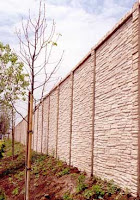Noise Attenuation Barriers

By Brian Madigan LL.B.
The problem with noise attenuation barriers is that sometimes they just magnify the sound. This is the case with the concrete barriers. Unlike wood fences which absorb and muffle the sound somewhat, the concrete barriers bounce the sound back into traffic where it hits other hard surfaced objects or a concrete barrier on the other side of the roadway.
In large measure, these barriers can be not only unsightly but relatively worthless. They just bounce the sounds around. For this reason, many municipalities do not approve their use.
So, what does work? Actually, the answer is relatively simple: trees. A fully mature tree with lots of foliage will work wonders when it comes to muffling the sound from a busy street.
The problem is that fully mature trees take 40 years to grow. So, what do you do in the meantime? For rapidly developing municipalities, concrete fences were the answer.
Berms work to some degree. This is an artificial hill. Road graders push dirt into a pile along the edge of the properties abutting the arterial road. At the top, they sometimes reach 12 feet in height. There is a drawback here as well. They are often 20 feet wide at the bottom. This means that in order to create a 12 foot high berm, you need about 20 feet in depth at the end of someone's lot. In most cases, this just isn't available. The lots are probably somewhat on the smallish side. So, this will take up about half of the rear yard. Berms do work, but there is a heavy cost in terms of land dedication to the solution.
Also, if berms are compromised somewhat, and made slightly smaller, trees and bushes can be planted on top of them. These will form a nice barrier and will soften the noise. You may also find, berms used in connection with fences, both wood and concrete as well as natural plantings muffle traffic sounds to a tolerable degree.
Traffic is louder if the speeds are changing. So, if vehicles are accelerating or decelerating, more noise is created. Constant regular noise without variation is like "white sound". It disappears. Road surfaces are also important. Concrete surfaces are noisier than asphalt; asphalt is noisier than mixed hard surface gravel.
If you are planning to use your backyard extensively for outdoor recreational uses, don't acquire a property along a major arterial road. If you are already there, consider hiring a landscaper to create an attractive berm in combination with trees and bushes and wood or concrete fencing to ameliorate the sounds. By the way, if you live under a flight path, you can't build a fence high enough.
Brian Madigan LL.B., Realtor is an author and commentator on real estate matters, Royal LePage Innovators Realty
905-796-8888
www.OntarioRealEstateSource.com

Comments(0)